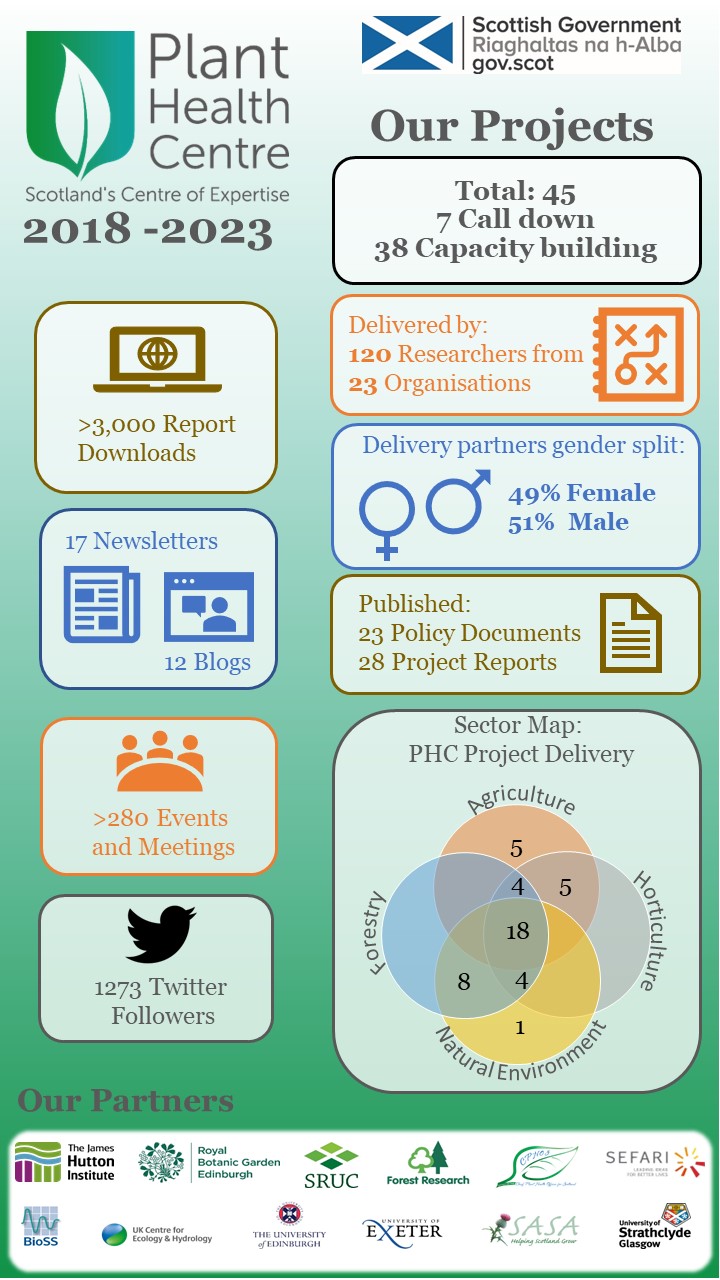Cultivating Scotland’s Plant Health Expertise: The achievements and future of the Plant Health Centre
This year the Scottish Government, through RESAS, has renewed its support of Plant Health Centre until 2026. As we start the next chapter of the Centre, we reflect on the achievements we have made in the last 5 years.
We are very proud of the progress made during the first programme of the PHC which ran from 2018-23. The PHC was set up as a dedicated virtual centre of expertise to tackle plant health challenges in Scotland. To strengthen our resilience by bringing together scientific knowledge and capabilities across trees, crops and the natural environment. It acts as a focal point for disseminating knowledge and advice rapidly and building capacity to help respond to any new plant health threats. The sheer scale of plant health issues facing Scotland, in terms of the plants affected, the different sectors reliant on healthy plants and the pests and diseases responsible, have made it necessary to reach out to a wide range of different actors across multiple scientific disciplines and stakeholder areas.
Our Directorate has some of Scotland’s leading experts on forestry, horticulture, natural environment and agriculture who, over time, have learned to speak a common language and gain an appreciation of other sectors and how solutions in one sector may be applied to others. To further strengthen ties between sectors, one of our goals has been to encourage projects with multi-sector relevance. This has included our ‘key principles’, which have provided a high-level step-by-step guide to plant health for a wide range of plant-based activities; a resource that has since been used in other projects, e.g. to provide more bespoke guidance for managing threats in the natural environment.
Figure 1. The Plant Health Centre’s Key Principles
Close contact with Scottish Government, particularly via the Chief Plant Health Officer for Scotland and the plant and tree health policy teams, has allowed us to keep abreast of changes in policy and how this might affect plant health. We have commissioned 45 projects over the past 5 years. The PHC has really brought the sectors together to tackle plant health issues with 60% of these projects addressing the needs of 3 or more sectors.

Figure 2. The Plant Health Centre’s Key Performance Metrics 2018-2023
Below we highlight some of the topics of focus for the plant health centre during its first phase.
Xylella fastidiosa
Of all the threats that need to be triaged and then dealt with, Xylella fastidiosa has been of particular concern, targeting over 500 potential plant species that include the iconic oak woodlands of Scotland. Our work has provided Scottish Government with Scottish- centric data on Xylella for use in their contingency planning – not least the potential role of our extensive heathlands in spreading the pathogen should it arrive. We have also built a fantastic team of Xylella experts across the UK, who can be called upon in the future to assist should the need arise. Such outcomes and teams are reflected in a host of other project areas, allowing us to build a wealth of knowledge and expertise in these areas.
Plant Health and the Natural Environment
The Natural Environment sector underpins Scotland’s landscapes, biodiversity, rural industries and recreational activities, but plant health awareness is less well developed than in the other sectors (forestry, horticulture and agriculture). A fellowship, in collaboration with NatureScot, highlighted serious habitat creation/restoration biosecurity shortcomings, identifying many pests potentially damaging to Sottish dwarf shrub heathlands, and developed a framework to address biosecurity risk assessment.
Integrated Pest Management
There are several drivers for reducing reliance on pesticides and promoting the uptake of Integrated Pest Management (IPM). The centre has commissioned several research projects focused on Integrated Pest Management in order to identify barriers to uptake and opportunities in Scotland. The Scottish IPM Assessment Plan has been enhanced and is now housed on the Plant Health Centre website. The aim of the plan is to give users simple tool to baseline practices and track the impact of changes.
The Recommissioned Plant Health Centre
What was once a disparate collection of Scottish stakeholders and researchers, with little if any coordination around plant health, is now a tightly knit community that works together to lessen the threat of plant pests and pathogens across sectors in Scotland through a co-ordinated exchange of knowledge and skills.
We have added impact officers for each of the sectors to increase the regularity and granularity of communications with stakeholders, ensuring that stakeholder needs are identified and shared with the Centre’s directorate. These evidence or improved knowledge exchange needs are then developed into the Centre’s open project calls. We have also included a Communications Officer to enhance the visibility and reach of Centre’s outputs.
Within the last 5 years the number of threats in the UK Plant Health Risk Register has increased from 977 in 2018 to over 1400 currently, trade volumes and sites of origin continue to change, and climate remains a major concern. There will be plenty of plant health issues to delve into in our new programme and we look forward to continuing this work and building onto the strong base that we have created.
We look forward to engaging with all our stakeholders and hope to see you at Scotland’s Plant Health Conference in 2024, see you then!
